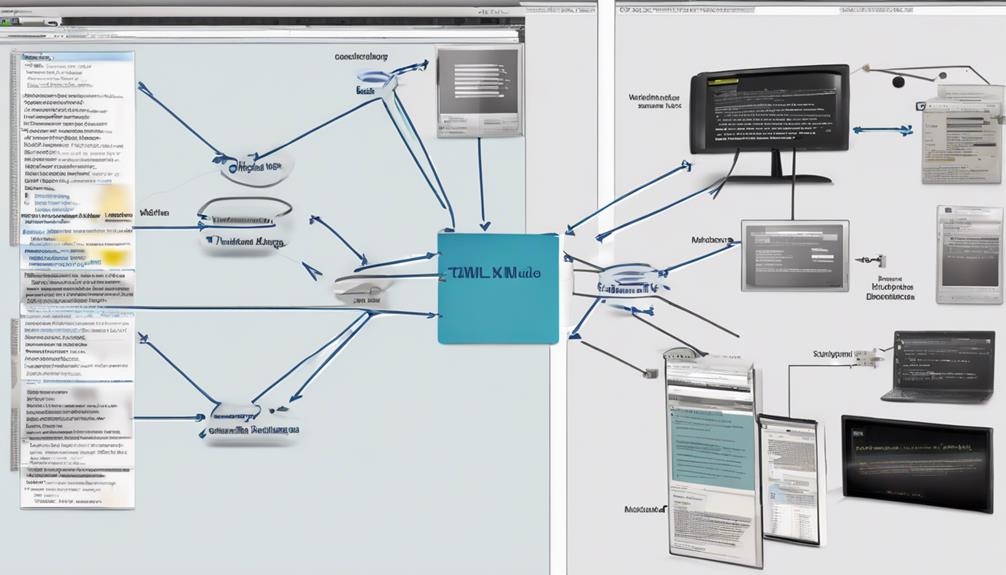You may have heard about the advantages of XML conversion services for businesses, but do you truly understand the depth of their impact across different sectors? Imagine the possibilities of streamlining your processes, enhancing data accuracy, and improving efficiency through structured information handling. These services offer more than just data management solutions; they can revolutionize the way you communicate between systems, optimize cataloguing, and handle critical information. Stay tuned to uncover the seven key ways XML conversion services can benefit and transform various businesses and drive success in today’s competitive landscape.
XML Conversion in Different Industries
When it comes to XML conversion in different industries, businesses are increasingly recognizing the need for efficient data management solutions. In the realm of manufacturing automation, XML conversion plays a crucial role in streamlining processes by converting complex manufacturing data into a structured format that can be easily accessed and analyzed. This facilitates smoother operations, enhances productivity, and enables seamless integration with other systems within the manufacturing environment.
Moreover, in terms of customer engagement, XML conversion allows businesses to effectively manage and utilize customer data for personalized marketing strategies. By converting customer data into XML format, businesses can create targeted marketing campaigns, tailor-made product recommendations, and personalized communication that resonates with individual customers. This level of customization not only enhances customer engagement but also fosters long-term relationships and loyalty.
Benefits of XML Conversion for Businesses
Harnessing the power of XML conversion can revolutionize your business operations, providing a multitude of benefits that enhance efficiency, data management, and overall performance. When considering XML conversion for your business, here are four key advantages to keep in mind:
- Cost Savings: XML conversion services can help reduce manual data entry tasks, leading to cost savings by minimizing labor expenses and increasing operational efficiency.
- Improved Accuracy: By converting your data into XML format, you can ensure greater accuracy in data handling and transfer processes, reducing the risk of errors and inconsistencies.
- Increased Productivity: XML conversion streamlines document workflows and enables faster access to information, boosting productivity levels across various departments.
- Streamlined Processes: Implementing XML conversion can simplify data exchange between different systems and applications, streamlining processes and enhancing overall business agility.
XML Conversion for Data Management in Businesses
To effectively manage and utilize data within businesses, adopting XML conversion services is paramount. XML conversion plays a crucial role in enhancing data accuracy by structuring information in a standardized format. This ensures that data is consistent, error-free, and easily searchable, leading to more reliable decision-making processes.
Through XML conversion, businesses can streamline information retrieval processes. By converting data into XML format, businesses can easily access and extract specific information when needed. This facilitates quick and efficient retrieval of critical data, saving time and improving overall operational efficiency.
Moreover, XML conversion enables businesses to organize and categorize data effectively, making it easier to store and retrieve information based on different criteria. This enhances data management practices and allows for better utilization of resources.
Role of XML Conversion in Business Efficiency
Enhancing business efficiency is a top priority for organizations seeking to stay competitive in today’s dynamic market. XML conversion plays a crucial role in streamlining operations and improving overall productivity. Here’s how XML conversion can benefit your business:
- Document Digitization: By converting paper-based documents into XML format, you can digitize your data and make it easily accessible and searchable.
- Efficient Information Retrieval: XML conversion allows for structured data storage, enabling quick and precise information retrieval when needed.
- Streamlined Workflows: With XML-structured data, workflows become more organized and automated, reducing manual intervention and speeding up processes.
- Enhanced Data Integration: XML facilitates seamless data integration across various platforms and applications, ensuring data consistency and accuracy throughout your business operations.
XML Conversion in E-commerce
How does XML conversion revolutionize the e-commerce landscape? When it comes to e-commerce integration, data migration plays a crucial role in ensuring seamless operations. XML conversion services can assist in transferring product data, customer information, and other crucial details efficiently, enhancing the overall customer experience. By converting data into XML format, businesses can streamline product cataloguing processes, making it easier to manage and update large volumes of products online.
Through XML conversion, e-commerce platforms can achieve better synchronization between various systems and databases, facilitating smoother operations and reducing the risk of errors. This technology enables businesses to structure their data in a standardized format, making it easier to share information across different platforms and applications. By optimizing product cataloguing through XML conversion, businesses can improve search functionality, categorization, and overall user experience on their e-commerce websites. Additionally, the seamless data migration process ensures that essential information is transferred accurately, minimizing disruptions and enhancing operational efficiency in the e-commerce sector.
XML Conversion in Finance
In the realm of finance, the utilization of XML conversion services brings about a transformative impact on data management and processing. Businesses in the financial sector can greatly benefit from XML conversion services for tasks like financial reporting and invoice processing.
Here are four key ways XML conversion can benefit finance businesses:
- Enhanced Accuracy: By converting financial data into XML format, businesses can significantly reduce errors in financial reporting.
- Streamlined Processes: XML conversion simplifies invoice processing by making data extraction and analysis more efficient.
- Improved Compliance: With standardized XML files, businesses can ensure regulatory compliance in financial reporting.
- Cost Efficiency: Implementing XML conversion services can lead to cost savings through improved data management and processing efficiency.
XML Conversion in Healthcare
Ready to streamline your healthcare operations? XML Conversion in Healthcare offers a way to efficiently manage health records, ensuring easy access to critical patient information. With data interoperability solutions, you can seamlessly exchange information between different systems, improving communication and coordination. Stay compliant with regulatory requirements by utilizing XML conversion services tailored to meet healthcare standards.
Health Records Management
When managing health records, the transition to XML conversion in healthcare has revolutionized the way medical information is stored and accessed. This digital transformation offers numerous benefits for health records management:
- Efficient Data Retrieval: XML conversion organizes health records in a structured format, making it easier to search for and retrieve specific patient information swiftly.
- Enhanced Data Security: By converting health records to XML, sensitive patient data can be encrypted and protected with advanced security measures, reducing the risk of unauthorized access.
- Improved Data Accuracy: XML conversion minimizes errors commonly found in manual data entry processes, ensuring that health records are accurate and up-to-date.
- Interoperability: XML facilitates seamless data exchange between different healthcare systems, allowing for better coordination of care and improved communication among healthcare providers.
The adoption of XML conversion in healthcare not only streamlines health records management but also enhances overall patient care by providing quick and secure access to vital medical information.
Data Interoperability Solutions
Leveraging XML conversion in healthcare enables seamless data interoperability solutions, transforming the way medical information flows across various systems. Data integration is streamlined, thanks to technology solutions that convert paper-based records into digital formats. Document digitization allows for efficient data processing, facilitating quick access to critical patient information and improving overall healthcare delivery.
By converting medical records into XML format, healthcare providers can enhance data interoperability, enabling different systems to communicate effectively and securely share patient data. This interoperability is crucial for ensuring that healthcare professionals have access to accurate and up-to-date information, leading to better decision-making and patient care.
Through XML conversion, healthcare organizations can implement robust data integration strategies, optimizing workflows and reducing errors associated with manual data entry. This not only improves operational efficiency but also enhances patient outcomes by ensuring that medical professionals have access to comprehensive patient records when making treatment decisions.
Regulatory Compliance Requirements
To ensure compliance with regulatory requirements in healthcare, XML conversion plays a pivotal role in streamlining data management processes. Document digitization and data standardization are essential components for meeting industry regulations effectively. Here’s how XML conversion services can benefit healthcare businesses:
- Efficient Data Capture: XML conversion helps in digitizing paper documents, enabling easy access to critical information while maintaining regulatory compliance standards.
- Interoperable Data Formats: By standardizing data through XML conversion, healthcare organizations can ensure seamless data exchange between different systems and platforms, aiding in compliance with regulatory mandates.
- Enhanced Data Security: XML conversion services help in securely managing sensitive patient information, adhering to strict regulatory guidelines such as HIPAA.
- Audit Trail Maintenance: Through XML conversion, healthcare businesses can track and manage data changes effectively, ensuring compliance with regulatory audit requirements and improving overall data integrity.
Frequently Asked Questions
Can XML Conversion Services Handle Complex Data Structures?
Sure, XML conversion services can handle complex data structures effectively. They ensure data integrity, addressing scalability concerns. By converting data into XML format, intricate structures are maintained, offering flexibility and reliability for diverse business needs.
How Does XML Conversion Improve Data Security for Businesses?
When you convert data to XML, it enhances security by organizing and encrypting information. Improved efficiency in accessing and managing data leads to enhanced accuracy. This process safeguards sensitive business data effectively, benefiting your operations significantly.
Are There Any Specific Regulations Regarding XML Conversion in E-Commerce?
Curious about the rules governing XML conversion in e-commerce? Well, buckle up! When it comes to data privacy, industry standards like PCI DSS and GDPR hold the reins, ensuring compliance and safeguarding sensitive information.
What Are the Cost Implications of Implementing XML Conversion in Finance?
When considering the cost implications of implementing XML conversion in finance, it’s crucial to conduct a thorough cost analysis. Be prepared for potential implementation challenges, such as data migration and system integration, to ensure a successful transition.
How Does XML Conversion Ensure Compliance With Healthcare Data Standards?
Ensuring compliance with healthcare data standards through XML conversion is vital. Did you know that 80% of healthcare data breaches occur due to poor data integrity? XML helps optimize workflows, enhancing security and accuracy.



